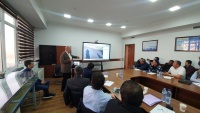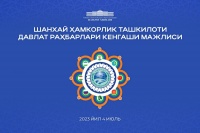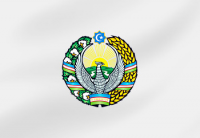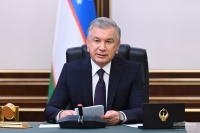Tasks defined to improve the efficiency of public healthcare system

On March 11, President of the Republic of Uzbekistan Shavkat Mirziyoyev held a meeting dedicated to improving the efficiency of public healthcare system in Uzbekistan.
In his Address to the Oliy Majlis in January 2020, the Head of the state identified priority tasks for improving people's health.
As noted at the meeting, approach prevails in the national healthcare system, in which more attention is paid to treatment of diseases rather than prevention.
According to WHO, human health by about 10 percent is provided by medication, 15 percent depends on genetics, and the state of the environment is affected at the level of 20 percent. Most importantly, in this ratio, up to 55 percent of factors that affect human health are related to lifestyle (physical activity, nutrition, bad habits).
In this regard, the Ministry of Health, Agency for Sanitary-Epidemiological Welfare and the State Inspectorate for Sanitary-Epidemiological Surveillance have been instructed to introduce a completely new system for promoting public health and a healthy lifestyle based on international best practices.
It was noted that disease prevention should begin primarily in rural areas and be implemented within a holistic system. For example, consumption of contaminated water leads to diseases of kidneys, gastrointestinal tract, food with poor chemical composition – oncological diseases, unhealthy lifestyle – diseases of cardiovascular, endocrine, and nervous systems.
The task is set to analyze these issues in depth and establish targeted work at places based on specific programs.
The spread of coronavirus infection (COVID-19) in the world to some extent causes concern among the population of Uzbekistan. Preventing the spread of this disease in Uzbekistan, which seems to test the strength of the world's public health system, requires first of all bringing the work of national health system to an even higher level, including in the direction of prevention.
In this regard, the Ministry of Health and the Agency for Sanitary-Epidemiological Welfare have been given additional instructions regarding the quarantine and preventive measures.
The need was noted for securing to the Agency for Sanitary and Epidemiological Welfare of the Center for Supporting a Healthy Lifestyle and increasing the physical activity of the population, focusing the Agency's potential on effective organization of solving these tasks.
Agency centers will be organized in the regions, districts and cities. Up to three specialists will be allocated in rural polyclinics for effective implementation of this work. They will promote proper nutrition, improve the culture of public and personal hygiene among villagers, and identify those who are at risk of oncological and cardiovascular diseases.
Rural medical centers are required to organize targeted medical examinations and examinations for infectious and non-infectious diseases. For example, after 40 years, the risks of heart attack, stroke, and diabetes increase, and women over 35 years are susceptible to oncological diseases.
At the same time, the Agency's employees will visit homes, educational and other institutions, promote principles of proper nutrition, active recreation and physical education.
President Shavkat Mirziyoyev gave relevant instructions to responsible persons for development of science on healthy life and supporting research institutes.
It was noted that these institutions should analyze factors and causes of diseases, develop appropriate recommendations, and the Agency should adopt and implement programs for each region.
At the same time, it was stated that research institutions are not ready to organize this activity.
Corresponding Research Institute has only 13.5 staff units for research of nutrition, labor, adolescent hygiene issues, as well as development of sanitary norms and rules.
Prevention and treatment system of parasitic diseases, rickets and dystrophy among children is also poorly organized. These diseases cause significant damage to immune system of young body and exacerbate its vulnerability to other diseases.
In this regard, the clinic of Samarkand Research Institute of Medical Parasitology will be merged with Research Institute of Epidemiology, Microbiology and Infectious Diseases. On their basis, the Republican Scientific and Practical Medical Center for Epidemiology, Microbiology, Infectious and Parasitic Diseases will be organized, which will unite medical and scientific activities.
The Head of the state focused on another important issue – the need for training specialists who will analyze factors of morbidity and give preventive recommendations to doctors.
The importance of speeding up the work on opening branches and clinics of Pirogov Russian National Research Medical University and Turkish Bahçeşehir University in Uzbekistan was noted.
Issues of early detection, accounting, analysis and conducting statistics of infectious and non-infectious diseases were discussed in detail at the meeting.
For example, out of about 24,000 cases of malignant oncological diseases diagnosed in 2018, 55 percent were detected at the third and fourth stages. This means that every second such patient does not have a favorable prognosis for recovery.
In this regard, the need for using simple, but modern and effective methods of preventing diseases and expanding the scope of their implementation was noted.
For example, basic procedures for measuring weight, height, waist circumference, and lifestyle surveys can help identify signs of heart attack, stroke, diabetes, hypertension and many other diseases in advance.
The President noted the need for reviewing the system of monitoring the health of the population.
In particular, there is every reason to say that there is no food safety system in Uzbekistan. For example, there is a categorical ban on the use of technical palm oil in food, but the appropriate control mechanisms have not been implemented. At the same time, this ingredient is dangerous for human health, affects vital organs and leads to oncological diseases.
Reports of responsible managers were heard on the issues discussed at the meeting, and appropriate measures were defined.











